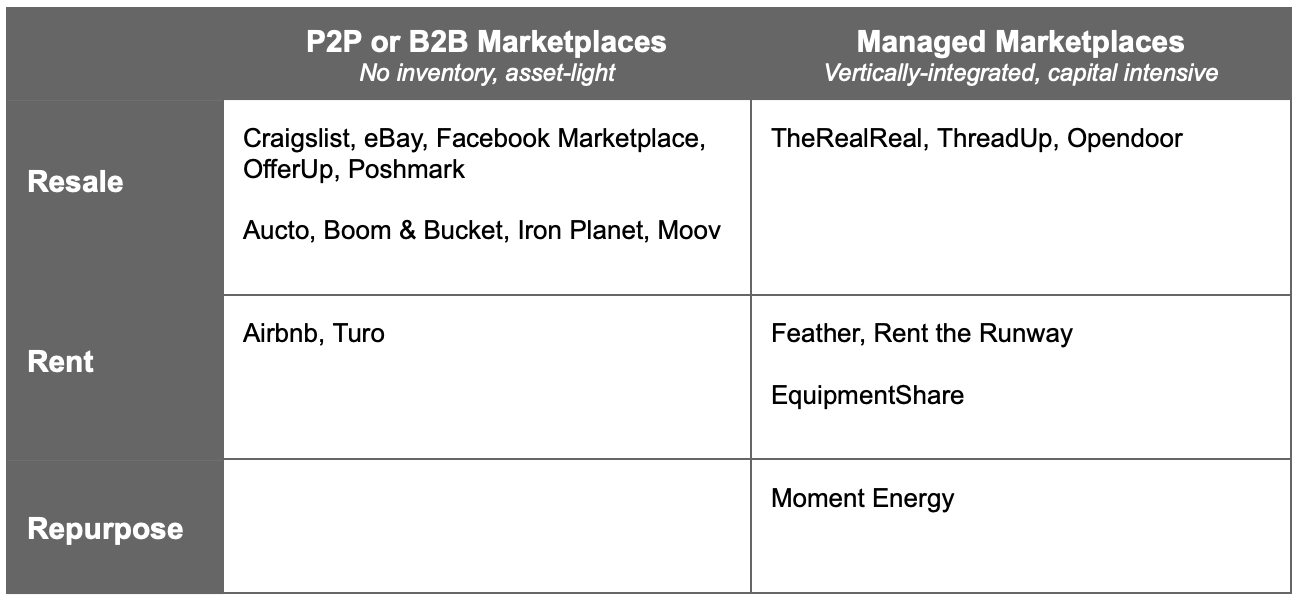

Contents
ABSTRACT
CONTEXT: THE ROLE OF MARKETPLACES IN THE CIRCULAR ECONOMY
Editor's note: The below is digested from the original post at VersionOne Ventures by Angela Tran. Click here to read her full analysis.
The key concept behind the Circular Economy is reuse — in order to reduce resource inputs and reduce waste. The idea of reuse is far from new and we commonly know it in the forms of platforms that allow for the resale and rent of goods and services.
And what’s often behind a resale or rent transaction? Marketplaces. You’re probably familiar with many resale or rent marketplaces, with category leaders sprouting out of specific verticals — from fashion, electronics, books, and cars, to home, equipment, furniture, and more. A sampling of these is included in the table (see the section "Table," below). Note that the table is not intended as an exhaustive list and covers physical goods only.
Managed vs. "pure" marketplaces
Zooming out, some reuse marketplaces serve as brokers that simply facilitate a connection between buyer and seller. They may integrate payments, conflict resolution, trust initiatives, etc. Others are vertically integrated or managed, taking inventory and handling more aspects of the transaction (e.g. cleaning, repairing, shipping) to remove even more friction between buyers and sellers.
In choosing a model, a marketplace needs to balance the effect of a better buyer experience with the downside of additional costs and complexity. We wrote about this in detail in our Guide to Marketplaces (check out “Marketplace types”, then “Managed marketplaces”).
It might just be that physical infrastructure is critical for Circular Economy marketplaces
Angela Tran~quoteblock
Relatedly, it might just be that physical infrastructure is critical for Circular Economy marketplaces.
For instance, reusable plastics have captured a lot of attention recently. As many cities adopt a ban on single-use plastics, we’re seeing companies building for this Circular Economy category: Boox, Dispatch Goods, Friendlier, Reusables, Suppli, and Topanga.
We believe that a marketplace here is inevitable. But will most likely need to be managed (i.e., very operations-driven, with tech as a complement) to handle the plastics lifecycle, which spans Collection, Repair and Sanitization, and Redistribution.
VISUAL: VERSIONONE INTRODUCES THE REPURPOSE MARKETPLACE

NEW CATEGORY: THE REPURPOSE MARKETPLACE
The third row of the table introduces a new category: repurpose. Per Wikipedia, this is “the process by which an object with one use value is transformed or redeployed as an object with an alternative use value.”
A great example of repurposing is Moment Energy, which converts EV batteries into energy storage units. When you recycle an EV battery, you dispose of the battery’s heavy toxic chemicals, so they don’t contaminate the environment.That’s important, but when the average EV battery is retired from a car, it still has 80% of its life left. Moment gives these batteries a second life, producing a highly affordable energy product, while reducing lithium waste.
Currently, Moment Energy is vertically integrated. They source batteries from many different OEMs, repurpose them into an energy storage unit, and then sell that energy storage to commercial and industrial partners, micro-grid and off-grid operators, utilities, etc. Moment’s infrastructure is important, but it’s the software that makes this product possible. The team is building a novel battery management system (BMS) specifically optimized for second-life batteries of different chemistries.
In the future, we can imagine Moment evolving into a more asset-light model, as its BMS is licensable and can thus become the main value-driver of the business.
I’m excited about the emergence of a new "Repurpose Marketplace" category, especially when software makes repurposing possible.
COMPANIES MENTIONED IN THIS BRIEF
- Moment Energy
- AirBnB
- ThredUp
- EquipmentShare
- Rent the Runway
- Boox.eco
- Dispatch Goods
- Friendlier
- Reusables
- Suppli.ca
- Topanga.io
ACKNOWLEDGMENTS
Special thanks to Mike Williams and the Everything Marketplaces community for their help on this post.